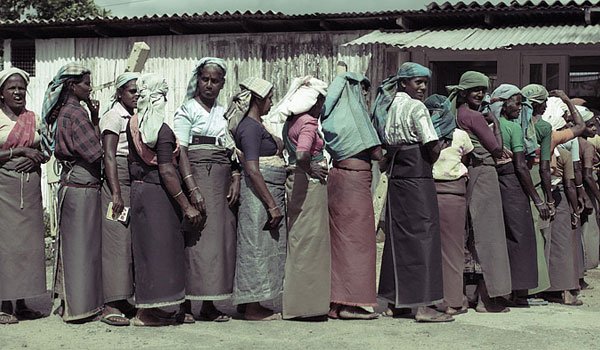The 2013 to 2015 agreement expires on March 31.
The planters association and estate trade unions of the former Rajapaksa regime’s CWC headed by Arumugam Thondaman, UPF of P. Radhakrishnan and NLU of P. Digambaram inked the agreement.
Despite the original idea of such a pact being to minimise pressure on labourers and safeguard their rights, what actually has taken place was the exploitation of their labour, a review of their lives in the past few decades shows.
Wages and allowances
The wage of a labourer, inclusive of all allowances, is Rs. 620, and the monthly income depends on the number of working days.
Seventy five per cent of labourers cannot secure the attendance allowance of Rs. 140, as they are unable to work 25 days a month.
Also, they are not paid one-and-a-half-day’s wage for working on a holiday.
Labourers cannot take sick leave for more than three days, and leave is permitted for even pregnant women very rarely.
Although a medical certificate is furnished, the company considers them as new recruits.
The average amount of tea plucked per day is 16 kilos, but superintendents raise it to 18, 20 or even 25 kilos in order to increase production volume.
The labourers are never consulted when increasing the daily targets.
Betrayal by TUs
In the face of pressure exerted by TUs, the labourers adopt a silent approach.
A notable exception was the uprising at a company owned by Maskeliya Plantations, where 600 labourers stayed away from work for three days to demand the reduction of the daily target to 16 kilos and a payment for additional two kilos.
The CWC and UPF intimidated the labourers against joining the strike, while the NLU sabotaged it on the pretext of supporting it, according to World Socialist website.
Later, an agreement reached by the TUs and the company resulted in the curtailment of several benefits for the workers.
Furthermore, eight labourers were arrested on fabricated charges, produced before courts and enlarged on bail.
Abandonment
The two year collective agreement has resulted in a Rs. 115 increase in the wage.
But, in comparison to increase in the costing of living, that is far inadequate.
The census department says the monthly spending of an estate family is Rs. 29,779.
However, their maximum income is only Rs. 12,000.
Following the curtailment of workers’ rights by the 1992 R. Premadasa regime which had privatised the estates, there was a drain of workers to the towns.
In the past 20 years, the number of labourers declined by 35 pc, from 345,000 to 208,000.
Collective agreement
In addition to the UPF and NLU, K. Velayudan’s CNEWU are the estate TUs that will represent the labourers under the good governance regime, while the CWC appears to keep away.
These politicized TUs will strike deals with the planters association which is bent on raising their profits.
A JVP-affiliate TU recently demanded in Colombo that the estate wage be raised to Rs. 800.
However, the planters association has already ruled out a wage hike, pointing to the collapse in the tea market and increase in production costs, jdslanka.org reports.






